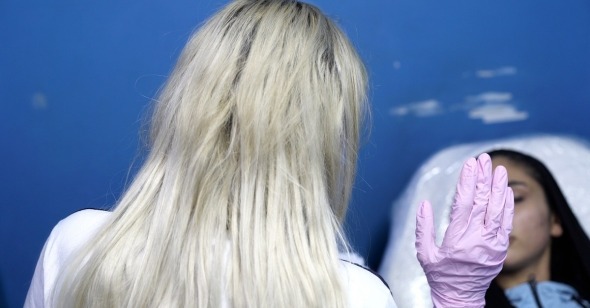Blood Rites
By Bedatri D. Choudhury
A Frown Gone Mad
Dir. Omar Mismar, Lebanon, no distributor
A woman with a puffed face is seen lying down on an examination table in Omar Mismar’s A Frown Gone Mad. Her lips are swollen, she has tears in her eyes, and blood trickles down her cheeks. But there is a hint of a satisfied smile, too. Woman after woman (and the occasional man) walks into Bouba’s sparse, blue-walled office in Beirut, asking for a shot of Botox here and some filler there. “Smile,” says Bouba, whose face we barely see. “Frown,” she says next, making a quick note of where the skin wrinkles and offering an even quicker diagnosis. Needles are pushed in and out; some squirm and some cry; others talk about wars and bombs. Mismar’s camera sits tightly behind Bouba’s back, only gazing at the top of the patient’s table. All we see, throughout the film’s 72 minutes, are people’s bloody faces and the back of Bouba’s arm administering the shots. But the specter of war and death in the Lebanese capital hovers like a shroud.
“What are you hearing? Will there be war here?” she asks the out-of-sight but audible Mismar in between clients. “No,” he says from behind the camera. Mismar punctuates the salon scenes with screenshots of Bouba’s Instagram stories; they range from tirades against war to using bombs as an advertising tactic. “20% off on everything filler and Botox…We blow up the prices,” the translated caption reads. War starts off as a distant threat but becomes a distressing reality soon enough. What is meant to be a bare-bones clinic to get lip fillers and skin tucks gradually becomes a space to commune, vent, grieve, and despair. People begin to discuss Hezbollah’s war policies and Israel’s war on Palestine and worry about Lebanon being next. “This is not 2006,” Bouba says, quickly metamorphosing into a reassuring political commentator but also a therapist and friend, “If they attack us, we will attack them.”
Salons and beauty parlors make for fitting cinematic spaces, as they bring together a social cross-section of people but only for a few fleeting hours. These people, who probably wouldn’t have interacted with one another as readily otherwise, unite in this space. Here, everyone is connected by their desire to look and feel better, in spite of the darkness that threatens to seep through the walls of the salon. A clear cinematic parallel is Nadine Labaki’s Caramel (2007), also set in a salon in war-torn Beirut, in which women come together to talk about their everyday problems and anxieties, love affairs and frustrations—things that seem insignificant compared to war and politics. The war doesn’t enter Layale’s salon in Caramel, but in A Frown Gone Mad, it invariably seeps into the narrative. And watching the film at a time when our news is filled with headlines of horror provides an uncommon perspective into lives that are witnessing destruction but are also locating ways to find joy and beauty.
But none of this is escapist. While Caramel makes for an easier watch, sitting through A Frown Gone Mad and its incessant visuals of jabbing needles is at times uncomfortable, even excruciating. The people we see may be talking of fuller lips and smoother cheeks, but we feel the sting of war all the same. “Lebanon’s beauty aficionados are a resilient and resourceful lot,” reads a 2022 article from The Economist. “When angry protesters blocked the roads in 2019, hoping to get rid of Lebanon’s government, those bent on cosmetic improvements simply headed for the clinic on foot.” When the violence became too much and people refrained from cosmetic procedures, the country’s plastic surgeons got busy treating burns and scars.
Bouba is hardly a plastic surgeon. And her little salon is a far cry from a legit clinic—it is hinted that she may not have the state-mandated qualifications required to administer these doses. But for her customers, she is an ever-flowing fount of beauty and wisdom. While administering a shot to a journalist whose face was left scarred after reporting on a bomb blast, Bouba proudly declares, “They destroy, we restore.”
An explosion in Beirut, she says, brought her a lot of business because people got dark circles under their eyes. “In wartime, our faces sag even faster,” Bouba says to a customer, “I never worked as much as I worked during the war.”
Bouba’s livelihood depends on people’s lack of confidence living in their own skin. Her championing her customers’ quest to find joy in beauty may sound contradictory. But the persistence of Mismar’s camera makes us assess what we assume of people who chase beauty at all costs. The paths we take to achieving our self-worth vary, but perhaps we are all running after a mirage of beauty in these ugly times. And maybe we’re all trying to find a blue-walled room where we can receive comfort, even when it means paying with a little blood.
